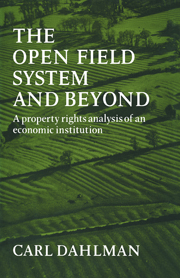Book contents
- Frontmatter
- Contents
- Preface
- 1 Introduction
- 2 Theories of the open field system
- 3 Property rights, transaction costs, and institutions
- 4 The economics of commons, open fields, and scattered strips
- 5 The economics of enclosure
- 6 Some extensions and generalizations
- Bibliography
- Index of names
- Index of subjects
- Frontmatter
- Contents
- Preface
- 1 Introduction
- 2 Theories of the open field system
- 3 Property rights, transaction costs, and institutions
- 4 The economics of commons, open fields, and scattered strips
- 5 The economics of enclosure
- 6 Some extensions and generalizations
- Bibliography
- Index of names
- Index of subjects
Summary
In recent years, economists have increasingly turned to inquire into the foundations of economic institutions. Economic agents are thought of as ‘teams’ or ‘clubs’, setting up voluntary organizations for cooperation and mutual gain. There is the beginnings of an economic theory of government and the State, as creations within the economic system. State and local governments are viewed as providers of services demanded by consumers; communication and control in economic organizations receive much attention, and the firm itself is increasingly the object of study as an entity whose existence must be explained. The economics of law and property rights is one of the most rapidly expanding branches of modern economics.
In this developing literature on the ‘economics of institutions’, however, contemporary economic institutions are so far receiving practically all the attention; and perhaps this is only natural. It is in attempting to understand our current environment that economics, as a social science, can make a claim to contribute to the shaping of human endeavors. While no one would deny the value of ‘lessons from the past’, to many it still seems more important to deal with immediate problems before attention is shifted to historical ones.
The prevalence of such attitudes notwithstanding, the present study deals with a social and economic institution that has long since disappeared: the open field system in England. The contention will be that there is indeed much for economic theorists to learn from a study of past economic institutions.
- Type
- Chapter
- Information
- The Open Field System and BeyondA property rights analysis of an economic institution, pp. 1 - 15Publisher: Cambridge University PressPrint publication year: 1980



